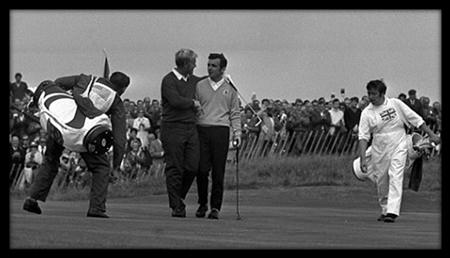Last week’s column attempted to highlight differences between how golfers, professional or amateur, respect the rules of their game compared to how athletes of other major codes regard theirs. Among the points raised was the notion that because golf requires players to be their own referee, the amount of respect shown between competing players as well as to the game’s core ethics, is greater than the equivalent in other sports.
This hypothesis led me to search for examples of what are considered acts of exemplary sportsmanship. One that stood out, as regards both merit and the printed word, involved the 1969 Ryder Cup played at Royal Birkdale Golf Club, England.
 Jack Nicklaus and Tony Jacklin shake hands as the walk off the 18th green during the 1969 Ryder Cup at Royal Birkdale, northwest England.
Jack Nicklaus and Tony Jacklin shake hands as the walk off the 18th green during the 1969 Ryder Cup at Royal Birkdale, northwest England.
Back then the contest was still between the US and Britain & Ireland (Team Europe came ten years later). With 12 wins from the previous 13 matches, American golf was very much in the ascendency. This year though, the British & Irish team was regarded as the strongest for some years with Captain Eric Brown confident of victory on home soil. This confidence did not extend to good sportsmanship, however, as he instructed his players to take every advantage possible, including not helping their opponents look for balls lost in the rough. This set the tone for an ill-tempered, spat-riddled affair.
Notwithstanding, the match developed into the best contest in years, with more than half of the 32 matches (as was played back then) going to the final hole. It was fitting therefore, that come the final day and with just the one game remaining, the scores were dead-level. It was also fitting that the contestants in this last match were arguably the two best players either side of the Atlantic – Britain’s Tony Jacklin and the USA’s Jack Nicklaus.
This last match had been close from the outset, with neither player enjoying more than a one-shot lead at any point. Nicklaus won the 16th to go 1-up. Jacklin holed a 50-footer on 17 to get back to square. The atmosphere was building to a crescendo as the contestants teed off the last. With both balls safely on the fairway, Nicklaus caught up with his opponent and asked him how he was feeling?
“Petrified,” Jacklin admitted.
Nicklaus, who by this stage in his career had won six majors, responded, “If it’s any consolation, I feel exactly the same.”
The climax to three days of intense golf was set to be played out in a packed cauldron-like atmosphere, as both golfers reached the 18th green in regulation. Jacklin, who was away, putted from 25-feet and stood transfixed as his ball finished dead on line, but a little over 2-feet short. He marked.
Nicklaus was later to tell of the adrenalin he felt surging through his veins as he lined up his putt for the win. It missed, leaving him with a very testing 4-foot return. The holder of six majors later admitted to not having previously experienced more pressure over a single putt. Notwithstanding, he drilled his ball into the centre of the cup.
Jacklin now faced a putt to halve the match as well as the tie. Whilst a length of 2-foot plus is not great, the circumstances were the most nerve-wracking he would ever face. What happens next is what this story is all about.
After picking his ball out of the hole, Nicklaus reached over and picked up his opponent’s marker, thus conceding the putt. He walked up to Jacklin and offered his hand, explaining, “I don’t think you would have missed that putt, but in these circumstances, I would never give you the opportunity.”
Both golfers left the green, an arm around the other’s shoulder, to sustained applause from the crowd. The overall score read 16-16; the first tie in Ryder Cup history.
Jacklin was later to refer to Nicklaus’s action as “the greatest single sporting gesture in golf,” but not everyone saw it that way. American captain Sam Snead was one, “It was ridiculous to give him that putt. We went over there to win, not to be good old boys.” Then president of the USPGA, Leo Fraser, appeared to side with Nicklaus when he graciously agreed to both nations sharing the trophy for a year apiece.
Eighteen years later the Americans were defeated on home soil, for the first time, after Larry Nelson graciously conceded a 2-foot putt to Bernhard Langer. The captains that year were Nicklaus and Jacklin.
That Jack Nicklaus is regarded as the greatest golfer to have ever played the game is sometimes disputed. What is not is that his conduct, whether winning or losing, was always the epitome of great sportsmanship. That and his 18 majors is what make him the greatest – something that any wannabe would do well to remember.
Winning is good. Winning well is better.
Happy golfing,
Golfnutter




